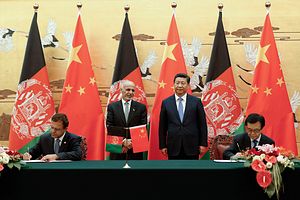Confirmation of Mullah Omar’s death has confused an already difficult picture in Afghanistan. Precarious relations between Afghanistan and Pakistan have been pushed even closer to breaking point, and the one bright spot, that of increased regional support, seems to have slipped onto the back burner. Beijing in particular needs to wake up and play a stronger leadership role in Afghanistan.
Afghan President Ashraf Ghani attended the Shanghai Cooperation Organization (SCO) Summit in Ufa with high hopes of again bringing the support of regional powers to bear on helping resolve his country’s ongoing civil war and the growing emergence of ISIS related terrorism within his country. On the face of it, the SCO would appear to be a very promising lead. Now expanding to include both India and Pakistan, the multilateral organization is one that manages to bring together almost all of the regional elements that are likely to be needed if we are to see a genuine local push to resolve Afghanistan’s problems. Its security architecture further offers a set of existing regional structures to discuss and implement some sort of regional response to Afghanistan’s perennial security threats. But thus far the organization has singularly failed to deliver much in terms of action on Afghanistan. The reality is that the real driver of a regional shift on Afghanistan is going to come from Beijing.
Looking solely within an SCO context, Afghanistan has only ever really been a focus under Chinese leadership. It was under Chinese stewardship that the SCO-Afghanistan contact group was created – when Beijing held the chairmanship in 2006. Six years later, it was at the 2012 Summit in Beijing at which the country was more formally accorded ‘Observer’ status. But very little activity has flowed from these shifts, and where we have seen action on Afghanistan from SCO members it largely appears to be at a bilateral level.
This includes China, which while it continues to act in Afghanistan through multilateral formats (for instance, through hosting of the trilateral discussions with Afghan and Pakistani officials), expends most of its attention on bilateral efforts. Yet these efforts have still not crossed the threshold to be decisive, and China still appears to be playing a hedging role in the country. Even in the peace talks that China is currently supporting (although the nature of its role in the wake of the Mullah Omar announcement seems unclear), it seems as though China remains an observer rather than a decisive actor.
Key to advancing China’s potential as a positive force in Afghanistan is to push the current slate of economic projects forward, as well as finding ways to ensure that the peace talks move towards some sort of resolution. Both are clearly difficult, but the first is far easier for the Chinese government move forward.
In late May the Afghan government revealed that Ghani had held talks with a Chinese construction firm to advance construction of the Jalalabad-Kabul road. The Chinese worries about the project were, understandably, primarily focused around security concerns, something that they saw as the remit of the Afghan authorities. This may indeed be the case, but the Chinese government could play a greater role in trying to offer training to Afghan forces to help improve their capacity to protect the Chinese project. Currently, China plays a somewhat marginal role in Afghan security, offering training to a few hundred police over many years, whilst also contributing some equipment to the ANSF. Whilst there are undoubtedly some logistical issues around training (linguistic differences for example), China could step up its equipment and financial support rather than only offering limited amounts of in-kind support.
More substantially in some ways than this, however, is the potential game changer that China could play in Afghanistan’s economy were some of the larger economic projects to come to fruition. At the moment, China is one of the biggest players with unrealized potential in Afghanistan. While CNPC has had some success in developing its field in the north, the Mes Aynak copper project continues to fester unfinished. During Xi Jinping’s head of state encounter with Ghani, discussion was made of the establishment of an intergovernmental committee to help the project move forwards. But there has been little movement since then, and it is unclear that we are going to see anything more in the near term future. This is hugely problematic as the project sits in a region that would benefit enormously from the investment.
At a more geostrategic level, Afghanistan also does not quite see where it fits into Xi Jinping’s great regional vision the Silk Road Economic Belt (SREB). Repeated conversations with Afghans have underscored that they have not understood where they fit into this grand vision for regional connectivity. The discussion around Afghanistan’s involvement appears to focus on how it might develop into an extension or part of the China-Pakistan Economic Corridor (CPEC) – the strategy for Pakistan to essentially become a corridor for goods going from Kashgar in Xinjiang to Gwadar Port in Baluchistan. Looking towards Central Asia, there has been discussion of some connections from Tajikistan extending into Afghanistan, but it is unclear that these are much of a focus for Chinese strategists and builders who are much more focused on developing routes through Central Asia to Russian and European markets. China needs to tell Afghanistan how it fits into the SREB.
China has set itself up to be a major player in Afghanistan’s future and expectations are being raised. It now needs to find ways of asserting itself both politically and economically to play the role that increasingly is being expected of it. Beijing may still shy from such ambitious aims, but at the same time, it is now too late to back away from them. China needs to find its feet and move forward in a more certain manner in Afghanistan.
Raffaello Pantucci is Director of International Security Studies at the Royal United Services Institute (RUSI) and Kane Luo is Vice President of Wakhan Abresham Consulting Service.

































